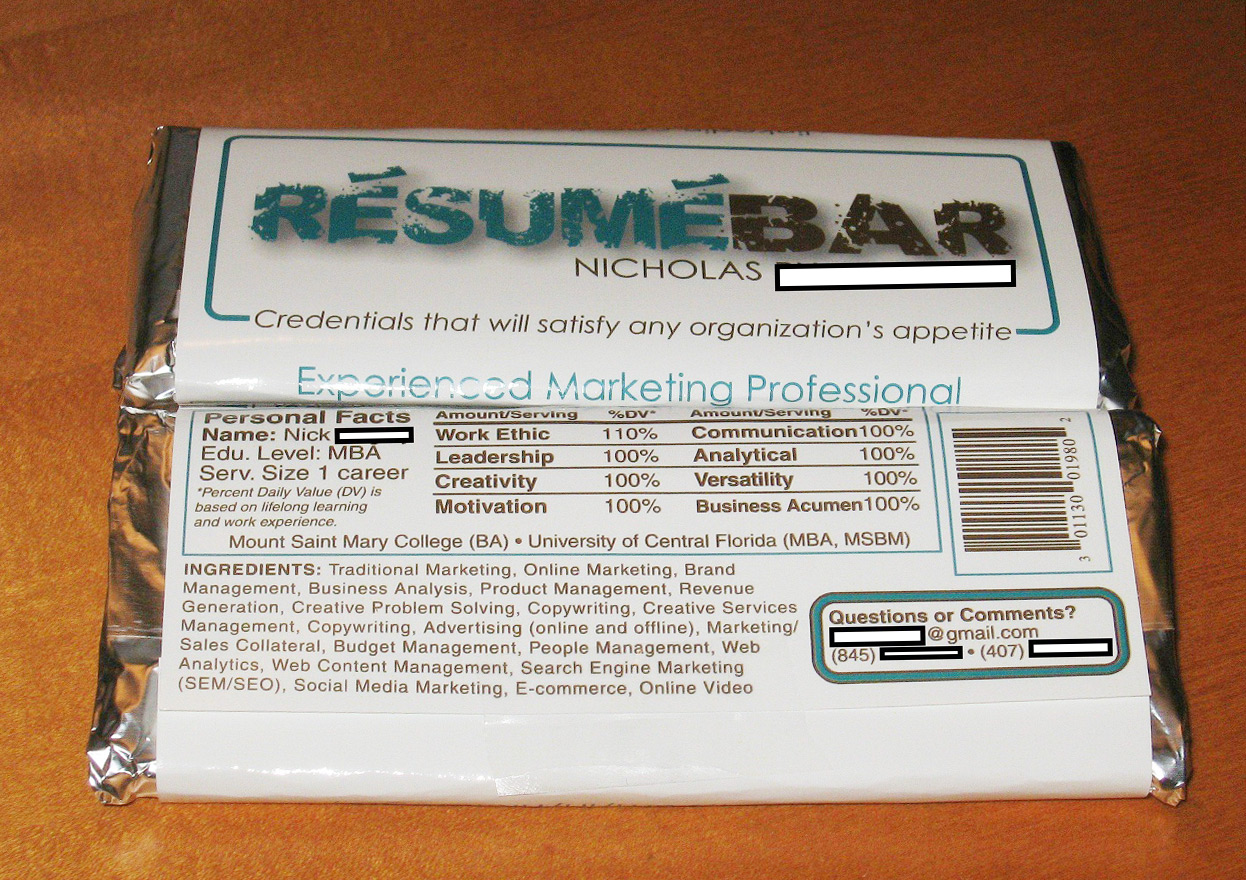
'You cannot dig a hole in a different place by digging the same hole deeper' - Edward de Bono
As I was browsing through some articles online, on resume writing and interviewing, I came across this innovative and inspirational resume - one that has flourished into great success - the mouthwatering Chocolate Resume!
The above photo displays a chocolate bar with a difference: the label reads 'Resume Bar: Nicholas'. At the bottom we can read 'Experienced Marketing Professional'. Yes, that's right - it's a resume!
This is not all. At the back of the chocolate bar, we don't have any nutritional facts - instead we have ingredients that any business would love to consume: 100% leadership, creativity, motivation, versatility, and business acumen.
Nick Begley, the maker of this chocolate resume bar, soon became an internet sensation with his innovative resume. In his own words, 'This version of the candy bar resume was used for a 2009 job search when the economy was crashing, so I knew I had to differentiate myself from other applicants'. He continues by saying that, '[i]t was a way to (hopefully) showcase my creativity, create a bit of a buzz in the department that was hiring and—most importantly—help me stand out in a competitive job market'. And so right he was!
 Internet sensation Nick Begley
Internet sensation Nick Begley
Undeniably, he got the job. This is what his future employer said: 'We must repeatedly review your resume before making a choice. Please send more copies of your resume'.
Mr Begley added to ABC News: ‘People are either going to love it or hate it. My focus was to find an organization that would embrace it because if they weren’t open to that kind of out-of-the-box thinking, that wouldn’t be a company that I would fit in well with anyways.’
To revert back to the epigraph of this article, 'You cannot dig a hole in a different place by digging the same hole deeper', Mr Berger has wittingly changed direction instead of trying hard - harder - in the same direction. Sadly, effort in the same direction or approach will not necessarily succeed.
The main source for these quotations was CNBC Social Media Producer Eli Langer, who is a personal friend of Mr Begley.
Have you heard of any other innovative resumes? Send us your comments!
Nikita Pisani at Muovo
Nick Begley, the maker of this chocolate resume bar, soon became an internet sensation with his innovative resume. In his own words, 'This version of the candy bar resume was used for a 2009 job search when the economy was crashing, so I knew I had to differentiate myself from other applicants'. He continues by saying that, '[i]t was a way to (hopefully) showcase my creativity, create a bit of a buzz in the department that was hiring and—most importantly—help me stand out in a competitive job market'. And so right he was!
 Internet sensation Nick Begley
Internet sensation Nick BegleyUndeniably, he got the job. This is what his future employer said: 'We must repeatedly review your resume before making a choice. Please send more copies of your resume'.
Mr Begley added to ABC News: ‘People are either going to love it or hate it. My focus was to find an organization that would embrace it because if they weren’t open to that kind of out-of-the-box thinking, that wouldn’t be a company that I would fit in well with anyways.’
To revert back to the epigraph of this article, 'You cannot dig a hole in a different place by digging the same hole deeper', Mr Berger has wittingly changed direction instead of trying hard - harder - in the same direction. Sadly, effort in the same direction or approach will not necessarily succeed.
The main source for these quotations was CNBC Social Media Producer Eli Langer, who is a personal friend of Mr Begley.
Have you heard of any other innovative resumes? Send us your comments!
Nikita Pisani at Muovo



 Like our Page
Like our Page













